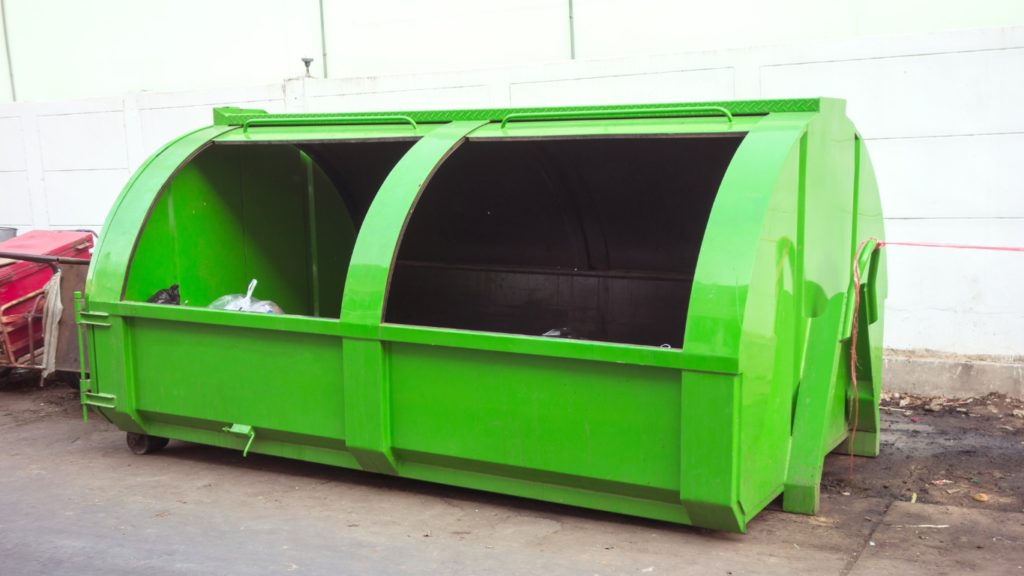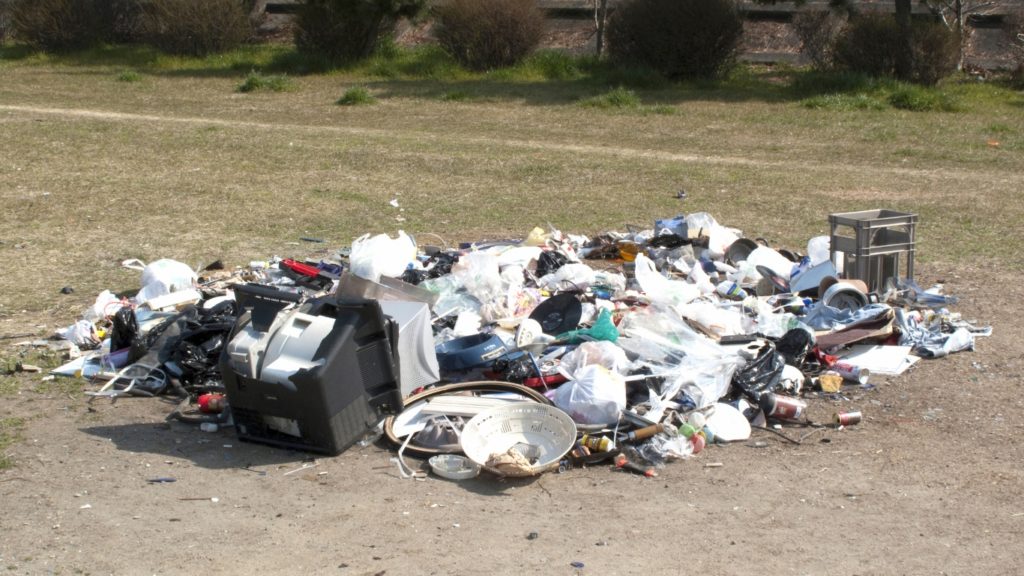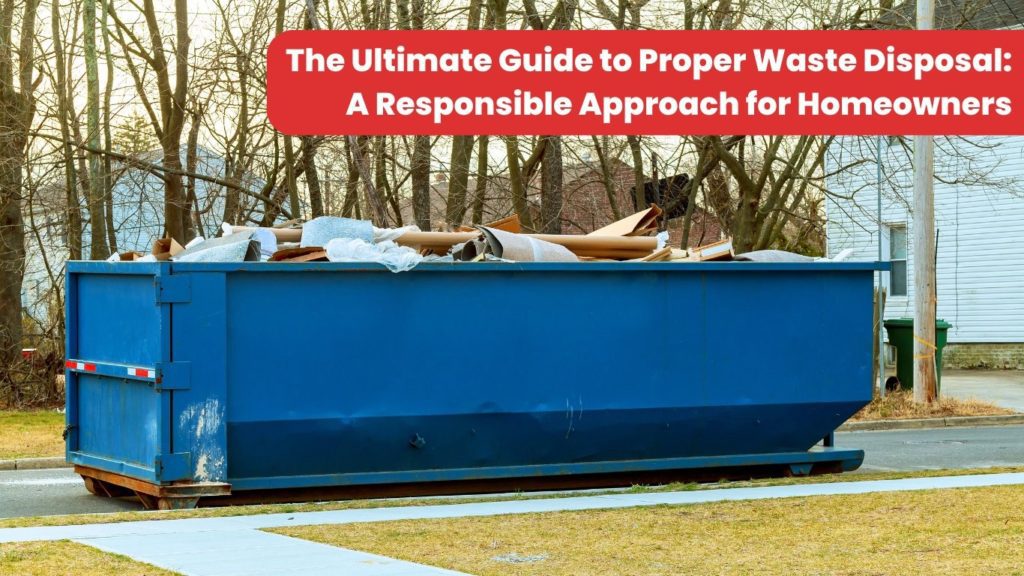Introduction
As homeowners, we have a crucial role to play in preserving our environment and safeguarding public health.
Proper waste disposal is a fundamental responsibility that directly impacts the world we live in. From reducing pollution to conserving resources, our waste management practices have far-reaching consequences.
In this blog, we’ll dive deep into the dos and don’ts of proper waste disposal for homeowners, exploring how responsible waste management can positively affect the environment, public health, and our communities.
II. The Dos of Proper Waste Disposal

A. Segregate and Sort Waste:
Proper waste segregation is the foundation of responsible waste management.
Separate your waste into different categories: recyclables, compostables, and non-recyclables.
Recycling prevents valuable materials from ending up in landfills, reducing the strain on our natural resources. Composting organic waste, such as kitchen scraps and yard trimmings, contributes to soil enrichment and diverts biodegradable materials from landfills.
Set up designated bins in your home for recyclables and compostables to make sorting waste easier for your family members. Label each bin clearly to ensure everyone knows where to dispose of specific items.
B. Follow Local Regulations:
Different areas have specific waste disposal guidelines and regulations. Familiarize yourself with your local waste management rules to ensure compliance. Adhering to these guidelines prevents potential fines and helps maintain a clean and healthy community.
Check your city or municipality’s website for information on waste disposal, recycling collection schedules, and any special rules for hazardous materials.
C. Use Recycling Facilities:
Utilize local recycling facilities or collection programs to maximize the recycling of materials.
Many communities offer curbside recycling programs, making it easy to participate in sustainable waste management.
Take advantage of recycling drop-off centers or collection events in your neighborhood to recycle items that may not be accepted in curbside recycling bins, such as electronics and household hazardous waste.
D. Compost Organic Waste:
Composting is a simple and effective way to reduce landfill waste. Compost kitchen scraps, yard waste, and even some paper products to create nutrient-rich soil amendments for your garden.
Start a compost pile in your backyard or consider using a compost bin to compost food scraps and yard trimmings. The resulting compost can nourish your plants, reducing the need for chemical fertilizers.
E. Opt for Reusable Products:
Minimize single-use waste by choosing reusable products over disposable ones. Invest in reusable water bottles, coffee cups, and shopping bags to reduce plastic waste.
Replace single-use plastic bags with reusable cloth bags when grocery shopping. Keep a set of reusable cutlery and a coffee mug in your car or bag to avoid using disposable utensils and cups when eating on-the-go.
III. The Don’ts of Proper Waste Disposal

A. Avoid Illegal Dumping:
Illegal dumping is not only harmful to the environment but also subject to severe penalties. Never dispose of waste in unauthorized locations such as vacant lots or natural areas.
Instead of tossing old furniture on the side of the road, consider donating it to a local charity or arranging for bulk waste pickup with your waste management service.
B. Don’t Dispose of Hazardous Materials:
Hazardous materials, such as batteries, electronics, and chemicals, require special disposal methods to prevent environmental contamination.
Take used batteries and electronics to designated recycling facilities or collection events for proper disposal.
C. Say No to Flushing Certain Items:
Flushing items like wipes, medications, and chemicals down the toilet can cause clogs in plumbing systems and contribute to water pollution.
Dispose of wipes and other non-flushable items in the trash, and never flush expired medications down the toilet. Look for medication take-back programs or consult with your pharmacist on proper disposal methods.
D. Don’t Burn Trash:
Burning waste, including plastic and other materials, releases harmful pollutants into the air and can be detrimental to both human health and the environment.
Avoid burning waste in open fires or incinerators. Instead, follow proper waste disposal methods for each material.
E. Avoid Mixing Waste:
Mixing recyclables with non-recyclables can contaminate the recycling stream, making it difficult to recycle materials properly.
Rinse out recyclable containers before placing them in the recycling bin to prevent contamination from leftover food or liquids.
IV. Proper Disposal of Specific Items
A. Electronics and E-waste:
E-waste, including old electronics and electronic accessories, should not be disposed of with regular household waste. Many electronics contain valuable materials that can be recycled.
Check with local electronics recycling programs or drop-off centers to safely dispose of old electronic devices.
B. Household Chemicals:
Household chemicals, such as cleaning products and pesticides, can be hazardous to human health and the environment if improperly disposed of.
Research designated collection events or hazardous waste disposal facilities in your area for the safe disposal of household chemicals.
C. Medications:
Improper disposal of medications can lead to water contamination and pose risks to wildlife. It is essential to dispose of medications responsibly.
Participate in medication take-back programs or follow specific guidelines provided by pharmacies or local authorities for proper medication disposal.
D. Appliances and Bulky Items:
Large appliances and bulky items require specialized disposal methods to ensure environmentally friendly practices.
Contact local donation centers or arrange for bulk waste pickup services to properly dispose of appliances and bulky items.
E. Construction Debris:
Home renovations often involve significant construction debris, including concrete, drywall, lumber, and other materials. Proper disposal of construction debris is crucial for minimizing waste and promoting environmentally friendly practices.
Fortunately, there’s a convenient and efficient solution to handle this type of waste: renting a dumpster specifically for construction debris.
At Red Rhino Dumpster Rental, we understand the challenges of managing construction debris during home renovations. Our dumpster rental service offers homeowners a seamless and sustainable way to dispose of construction waste responsibly. Here’s how renting a dumpster from Red Rhino can simplify your waste disposal during home renovations:
- Efficient Waste Management: Renting a dumpster from Red Rhino streamlines the process of construction waste removal. Instead of making multiple trips to disposal sites, you can conveniently dispose of debris as it accumulates. Our dumpsters are delivered directly to your property, ensuring easy access and efficient waste disposal throughout the renovation project.
- Size Options to Suit Your Needs: We offer various dumpster sizes to accommodate the volume of construction debris generated during your home renovations. Whether you’re working on a small bathroom remodel or a large-scale home expansion, we have the perfect dumpster size for your specific needs. Our 12 and 20-yard Hook-Lift dumpsters provide ample capacity without taking up excessive space on your property.
- Responsible Recycling Practices: Reducing the environmental impact of construction waste is a top priority at Red Rhino. We are committed to promoting sustainability by prioritizing recycling and responsible disposal. When you rent a dumpster from us, you can trust that we’ll handle your construction debris in an environmentally friendly manner, diverting materials from landfills whenever possible.
Imagine you’re renovating your backyard to create a stunning outdoor living space. During the project, you need to dispose of broken concrete, old fencing, and wood scraps. Renting a 20-yard Hook-Lift dumpster from Red Rhino allows you to efficiently remove these materials as you progress with the renovation. Once the dumpster is filled, our team will pick it up and ensure that the debris is properly sorted for recycling or appropriate disposal, saving you time and effort.
V. Educating Children and Family Members
A. The Importance of Waste Education:
Teaching waste management practices to children instills responsible habits early on and fosters a sense of environmental stewardship.
Involve children in household recycling activities, such as making it a fun challenge to separate recyclables correctly.
B. Encourage Recycling:
Engage children in recycling by educating them on the importance of recycling and the positive impact it has on the planet.
Create a recycling chart or reward system to encourage children to actively participate in recycling efforts at home.
C. Promote Waste Reduction:
Implement strategies as a family to reduce waste, such as buying in bulk, using reusable containers, and avoiding excessive packaging.
Challenge family members to reduce waste by implementing a “Zero Waste Week” or setting goals to minimize single-use items.
VI. Benefits of Proper Waste Disposal
A. Environmental Benefits:
Responsible waste disposal reduces pollution, conserves resources, and protects ecosystems, contributing to a healthier planet.
Recycling paper saves trees and reduces energy consumption, while composting organic waste enriches soil fertility.
B. Public Health Benefits:
Proper waste management safeguards public health by minimizing exposure to hazardous materials and preventing the spread of diseases.
Safe disposal of household chemicals ensures that harmful substances do not contaminate the air or water supply.
C. Social and Community Benefits:
Collective waste disposal efforts foster a sense of community and environmental responsibility, creating a cleaner and more livable neighborhood.
Organizing community clean-up events or participating in local recycling initiatives strengthens community bonds and encourages sustainable practices.
VII. Conclusion
As homeowners, we hold the power to make a positive impact on the environment and public health through responsible waste disposal practices. By following the dos and don’ts of proper waste disposal, we contribute to a cleaner and healthier planet for future generations.
Take pride in being an environmentally conscious homeowner and inspire others in your community to join the cause. Together, let’s build a greener, more sustainable world by adopting responsible waste management practices in our daily lives. Start making a difference today!
At Red Rhino Dumpster Rental, we are committed to providing fast, efficient, and reliable dumpster rental services to support your home improvement endeavors and proper waste disposal. Make your next renovation project a breeze by partnering with Red Rhino and experiencing the convenience and peace of mind that comes with responsible waste disposal.
Contact us today to learn more about our dumpster rental options and take the first step toward a cleaner and greener home renovation experience.


